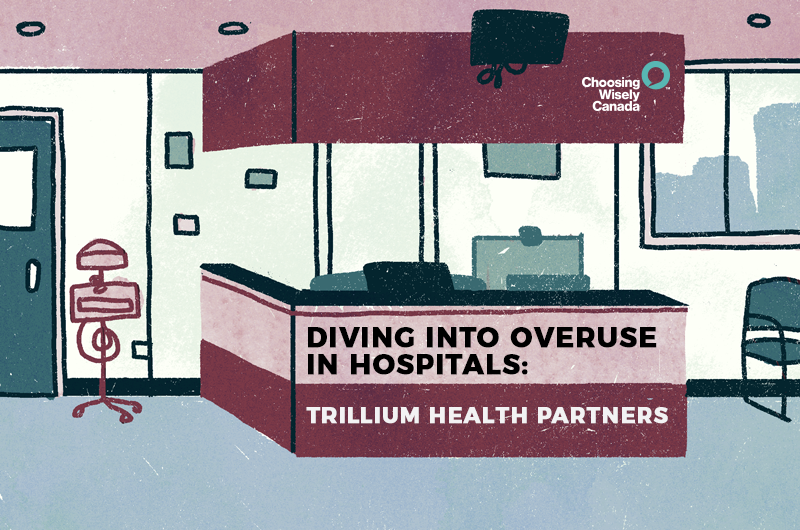Choosing Wisely at Trillium Health Partners
Jan 9, 2019 - Profiles
See how Trillium Health Partners in Mississauga, Ontario is diving into overuse and reducing unnecessary tests and treatments.
Choosing Wisely at Trillium Health Partners
Jan 9, 2019 - Profiles
See how Trillium Health Partners in Mississauga, Ontario is diving into overuse and reducing unnecessary tests and treatments.

Trillium Health Partners (THP) is a hospital organization made up of Mississauga and Credit Valley Hospitals, as well as Queensway Health Centre. The Mississauga Hospital site houses the largest 24-hour Emergency Centre as well as the largest concentration of critical care services in Canada – meaning that small changes to ED order sets, as well to other department test profiles and order sets, have big implications for the organization’s laboratory utilization.
In 2011 Dr. Kun-Young Sohn joined THP as a clinical biochemist and as he recalls ‘it was hard to believe people were still using total CK when an even more specific marker -CK-MB – was starting to be faded out [of common practice]’. Even after the introduction of troponin as the most specific marker of myocardial injury, total CK is still included today in many hospitals laboratory test profiles and clinical order sets. When undertaking this project Dr. Sohn had found that several community hospitals labs around the Greater Toronto Area (GTA) were struggling to control the utilization of total CK and decided to change this at the THP sites.
Before Dr. Sohn introduced the initiative over 60, 000 total CK & troponin tests were being jointly ordered annually across both sites. It was decided that implicated clinical areas such as the ED Program and Cardiology Division of the Internal Medicine Program would be consulted about how to rectify these ordering practices. Consensus was reached and support from clinical experts was given to an educational memo being sent out from the Laboratory Medicine Program informing all hospitals programs to only order troponin as the biomarker for cardiac testing and not troponin & total CK jointly. After sending out the memo, the index of total CK/troponin testing remained same at site A but decreased by approximately 40% at the site B. Realizing that education alone would not be enough to change behavior across both hospital sites Dr. Sohn, along with THP’s Manager and Director of Laboratory Services, decided to turn to a systems-based intervention and change the hospital’s order sets and lab profiles.
Dr. Sohn notes, ‘changing clinician ordering behavior is not easy. It takes years for new evidence to be integrated into practice. The evidence was strong enough around this particular test that we decided to help physicians by changing the test menu’. After removal of total CK from the test profiles and order sets, the index dropped significantly to 6 total CK tests ordered for every 100 Troponin tests at the site A and 12 at the site B.
The results achieved by THP imply that although educational memos are helpful in creating a dialogue about evidence-based practices, higher leverage interventions such as modifying laboratory test profiles and clinical order sets have the potential to yield significant and more sustainable results.
